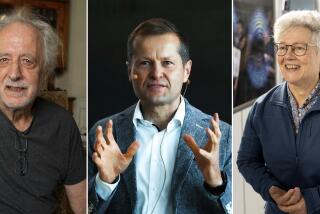Faster than light? CERN findings bewilder scientists
- Share via
Albert Einstein had the idea. A century of observations have backed it up. It’s one of the cornerstones of physics: Nothing travels faster than the speed of light.
But now a team of experimental physicists at the European Organization for Nuclear Research, known as CERN, says that one exotic particle possibly can.
The scientists reached their conclusion after sending streams of tiny, subatomic particles called neutrinos hurtling from an accelerator at CERN outside Geneva to a detector at the Gran Sasso National Laboratory in Italy, about 450 miles away.
The neutrinos seemed to get there too soon — 60 nanoseconds too soon, give or take — than they should if they’d been traveling at the speed of light.
That slight edge, if it holds up under scrutiny, has enormous implications for our understanding of the laws of nature, physicists said.
“Basically, all of special relativity would be wrong,” said Drexel University physics professor Dave Goldberg, referring to Einstein’s 1905 theory establishing that light travels at a constant speed, regardless of how fast an observer is traveling, and that nothing in the universe can go faster than it.
“If you have particles traveling faster than the speed of light, you can in principle go back in time. So you can be your own grandmother. As you can imagine, that causes some problems,” said Stephen Parke, a theoretical particle physicist at Fermilab in Batavia, Ill.
The operative word is “if.”
“I’m fairly skeptical. I expect most people are,” Goldberg said.
The physicists responsible for the work said they’d checked their findings stringently.
“We wanted to find all possible explanations for this. We wanted to find a mistake, but we didn’t,” said physicist Antonio Ereditato, spokesman for the so-called OPERA experiment, in an interview with the BBC on Thursday.
Because it was such “a crazy result,” the team was releasing its data, based on three years of measurements, so that others in the scientific community could confirm or refute the findings, he added.
The researchers posted the paper online Thursday evening and planned a seminar at CERN to discuss the findings Friday.
But even before the paper was available, scientists with the capability to generate and measure the speed of neutrinos were gearing up to try to duplicate the results.
“As you can imagine, something like this is so revolutionary that everyone who can weigh in will be attempting to do so,” said particle physicist Rob Plunkett, co-spokesperson for the MINOS experiment at Fermilab.
In 2007, MINOS scientists also clocked neutrinos apparently moving faster than the speed of light, but the margin of error for that experiment was far greater than what was reported at CERN.
“It was not enough to make a scientific claim,” Plunkett said.
MINOS scientists may perform experiments of their own in as soon as six months, said particle physicist and MINOS co-spokesperson Jenny Thomas.
Plans to test the CERN results in Japan’s multinational T2K (Tokai-to-Kamioka) experiment are in the works, said neutrino physicist and T2K spokesman Chang Kee Jung.
Noodling the ramifications — should the findings be confirmed — gave physicists pause. There are just too many things in nature that special relativity explains.
“What does it mean? I don’t know,” Goldberg said. “The list of things we believe we understand still have to be true. You’d have to have another theory that makes them all work, but also accounts for this.”
Parke, a fellow skeptic, said the findings could be explained without tossing out special relativity. For one thing, he said, it’s possible the neutrinos’ passage hadn’t been timed accurately.
Or maybe the neutrinos were traveling through different dimensions, taking shortcuts from Geneva to Gran Sasso.
“The jury’s still out,” Plunkett said. “It’s revolutionary in principle. One has to approach it with healthy skepticism.”








